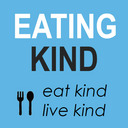by eatingkind | Oct 18, 2012 | Blog
This past Saturday, my sister, hubby and I attended the Farm Sanctuary’s Walk for Farm Animals. The day turned out to be wonderfully sunny and beautiful (a nice surprise, it being October and San Francisco), which made the whole experience that much more enjoyable. The magnificent backdrop of the Golden Gate Bridge and the happy collage of families, kids, and doggies enjoying the beach, the water and each other added even more magic to it.
 Over a hundred people came to the walk – armed with posters, t-shirts and songs. It was quite motivating to be in the company of so many others who not only care about animal welfare but are taking it further by living vegetarian and vegan. And it wasn’t just individuals who were there in full force, numerous vegan restaurants and brands, from wine to dog food made a showing as well.
Over a hundred people came to the walk – armed with posters, t-shirts and songs. It was quite motivating to be in the company of so many others who not only care about animal welfare but are taking it further by living vegetarian and vegan. And it wasn’t just individuals who were there in full force, numerous vegan restaurants and brands, from wine to dog food made a showing as well.
Hearing Gene Baur was the highlight for me. As a meat eater I was a little worried about going to a vegan-hosted event and felt somewhat like an imposter in the midsts of dairy-free parfaits and meatless hot dogs. I needn’t worry! Gene’s speech and the overall mood of the gathering was very positive, focusing more on the benefit of eliminating all animal products, rather than the horrible and heinous meat eaters. I felt welcome, not judged and most importantly motivated to do more.
 My only disappointment was that vegetarianism was not mentioned as a path to improving farm animal welfare. I believe that humane buying decisions when it comes to cheese, eggs, dairy, etc have a HUGE and positive impact on farm animals and should be promoted and celebrated. As ideal as it would be for the world to go vegan, it is a lofty goal, and veganism is likely to remain a small, albeit growing movement. While I agree that veganism, hands-down, has the greatest benefits for the animals and the environment, vegetarianism has the potential to reach many more people!
My only disappointment was that vegetarianism was not mentioned as a path to improving farm animal welfare. I believe that humane buying decisions when it comes to cheese, eggs, dairy, etc have a HUGE and positive impact on farm animals and should be promoted and celebrated. As ideal as it would be for the world to go vegan, it is a lofty goal, and veganism is likely to remain a small, albeit growing movement. While I agree that veganism, hands-down, has the greatest benefits for the animals and the environment, vegetarianism has the potential to reach many more people!
And while I don’t expect vegans or vegetarians to promote any sort of meat consumption, I personally believe that reducing meat consumption and buying only humanely raised meat also improve farm animal welfare and has an even greater potential for acceptance.
Now back to the me doing more part. I’ve written several posts about finding myself having meatless meals more and more often these days. Farm Sanctuary’s walk has invigorated me to take my meatless eating to the next level. While Meatless Mondays are now second nature, the other six dinners usually consist of meat or seafood, so starting this week we are implementing a second meatless dinner on our weekly menu.
Even though I read about animal welfare issues every day and write about them weekly, hearing someone who has made a decision to become a vegan 18 years ago and then dedicated his life to improving farm animal welfare by creating several sanctuaries and spreading the word, is that much more motivating and change-inspiring!
by eatingkind | Jul 27, 2012 | Blog
In my constant research and reading about the topic of eating kind, I came across this great article that talks about things we can do today (some of them are VERY easy) to directly improve welfare of farm animals. Read the full article here or see below for my summary:
Incorporate the Three R’s into Your Life
- Refinement: look for humanely raised products
- Replacement: look for vegetarian alternatives
- Reduction: reduce meat consumption by just one meal a week
The reduction part seems pretty easy to do and the results are fantastic! According to MSPCA, “if we reduce the consumption of animal products by just one meal a week, approximately one billion animals would be spared the suffering that occurs with intensive confinement operations.” And when we do buy meat, stick with the humanely-raised options!
Support Legislative Action
There are many websites and organizations that make it very easy to take legislative action, including keeping you up to date on various issues and even providing email templates so making a change is as easy as pushing a button! My go-to websites are Farm Sanctuary and HSUS.Sounds pretty easy, doesn’t it?!
by eatingkind | Jun 28, 2012 | Blog
More resources are available on the Products & Places page, but here’s a summary of what to look for (and where) when buying your humanely raised meats.
There may be others, but here’s a short list of local grocers that carry humanely raised products.
When shopping, look for these key words on your meats:
- Beef: Look for “pastured”, “pastured-raised”, “non-confined”, “no added hormones” and “no antibiotics” labels.
- Pork: Look for “pastured”, “pasture-raised”, “free-range”, “non-confined” or “raised in deep-bedded housing” labels.Under federal regulations hormones are not allowed in raising pigs.
- Chicken: Look for “pastured”, “pastured-raised”, “non-confined” and “no hormones” labels. Beware of the “cage-free” and “range-free” labels because they don’t tell the whole story about whether chickens were treated humanely. Under federal regulations hormones are not allowed in raising chickens.
- Eggs: Look for “pastured” or “pasture-raised” labels. Beware of the “cage-free” and “range-free” labels because they don’t tell the whole story about whether chickens were treated humanely.
- Dairy: Look for “pastured”, “pasture-raised”, “no hormones” and “no antibiotics” labels.
by eatingkind | Jun 25, 2012 | Blog
How do you convince habitual meat eaters to choose, eat and enjoy a vegetarian dish when yummy meat dishes are fighting for their attention?
The answer is pretty simple and it’s this: cook a delicious vegetarian dish as part of the line up. And I’m not just talking about putting out more veggie side dishes and salads (although those don’t hurt either), but providing a true vegetarian meal that can hold its own against its protein partner.
Unconvinced? I have two recent cases in point.
(more…)
by eatingkind | Jun 11, 2012 | Blog
My switch to eating only humanely-raised products has been relatively easy as many restaurants and grocers in the Bay Area offer options for free-range chicken, grass-fed beef and pastured pork. In addition, my timing aligned nicely with two of my main grocers’decision decision to start carrying humanely-raised brands which made my switch even easier (Safeway and Nob Hill).
Part of the change included incorporating ‘Meatless Mondays’ into our routine, which for my husband and I means one to two ‘no meat’ days and two to three ‘seafood’ days each week. While overall there are plenty of dishes to choose from, there are grocery trips when I’m feeling lost as to what to buy for a ‘meat-reduced’ dinner menu for the week.
I would love to hear about the successes and struggles you’ve had with buying and eating humanely-raised meats. Have favorite tips or recipes? Share those too. Comment away!
 Over a hundred people came to the walk – armed with posters, t-shirts and songs. It was quite motivating to be in the company of so many others who not only care about animal welfare but are taking it further by living vegetarian and vegan. And it wasn’t just individuals who were there in full force, numerous vegan restaurants and brands, from wine to dog food made a showing as well.
Over a hundred people came to the walk – armed with posters, t-shirts and songs. It was quite motivating to be in the company of so many others who not only care about animal welfare but are taking it further by living vegetarian and vegan. And it wasn’t just individuals who were there in full force, numerous vegan restaurants and brands, from wine to dog food made a showing as well. My only disappointment was that vegetarianism was not mentioned as a path to improving farm animal welfare. I believe that humane buying decisions when it comes to cheese, eggs, dairy, etc have a HUGE and positive impact on farm animals and should be promoted and celebrated. As ideal as it would be for the world to go vegan, it is a lofty goal, and veganism is likely to remain a small, albeit growing movement. While I agree that veganism, hands-down, has the greatest benefits for the animals and the environment, vegetarianism has the potential to reach many more people!
My only disappointment was that vegetarianism was not mentioned as a path to improving farm animal welfare. I believe that humane buying decisions when it comes to cheese, eggs, dairy, etc have a HUGE and positive impact on farm animals and should be promoted and celebrated. As ideal as it would be for the world to go vegan, it is a lofty goal, and veganism is likely to remain a small, albeit growing movement. While I agree that veganism, hands-down, has the greatest benefits for the animals and the environment, vegetarianism has the potential to reach many more people!
